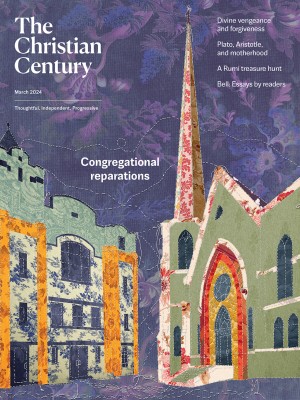March 31, Easter 1B (Mark 16:1–8)
Resurrection flies in the face of everything we know to be true.
“Free at last, free at last, thank God almighty I’m free at last!” These resounding words are most often remembered as the closing words of Martin Luther King Jr.’s “I Have a Dream” speech, but they are taken from the spiritual “Free at Last”:
Way down yonder in the graveyard walk,
Me and my Jesus going to meet and talk.
On my knees when the light passed by,
Thought my soul would rise and fly.
Some of these mornings, bright and fair,
Goin’ to meet King Jesus in the air.
Free at last, free at last,
Thank God Almighty I’m free at last!Read our latest issue or browse back issues.
The freedom described in this spiritual is a freedom born of life after death. The writer is yearning for freedom from the consequences of death. Resurrection, the expected upending of death’s consequences, is not only something to reach for but something that changes how we live here and now.
As day breaks on the first day of the week, the women go to a place of death with bags full of spices, expecting the responsibility of masking death’s odor. They wonder how the stone will be rolled away, but as they near the tomb they see that someone has already taken care of this seeming impossibility for them. They rush in and have an unexpected encounter with a young man dressed in white. They are no doubt perplexed and confused, maybe even afraid that someone has stolen the body and that their friend will not be able to have a proper burial.
The young man tells them not to be alarmed: Jesus is no longer there because he has risen. “Don’t be alarmed”—this seems callous at best, maybe even mean-spirited. Of course they are alarmed! Less than 48 hours ago they watched in horror as Jesus was taken down from the cross. I am, on some level, offended by the attitude of the white-robed man, or at least I deeply empathize with these sisters. Everything around them says death, so they come to the tomb, expecting death. But they are met instead with an empty tomb and a word about resurrection. They are told to witness the empty place where Jesus’ body has been. All these years later, their Easter experience is not too much different from ours.
They expect death, they are met with an empty tomb, and then they get a word about resurrection. This is exactly what we have today. We come with the expectation of death in this dying world all around us, and then we receive a word of resurrection. God always seems to do things the hard way. They saw Jesus suffer and die. Why doesn’t God allow them to come to the tomb and watch Jesus walk out into the light of a new day? Wouldn’t it be easier for us if we could see Jesus simply appear? But no, we come to the Easter event with the same thing these women had, a word about resurrection that flies in the face of everything that we know to be true.
What I love about Mark’s version of the story is that the women’s initial experience of this word of resurrection is unsettling. The hope of the resurrection does not emerge instantly. Their first response is bewilderment buttressed by silence and fear. Maybe if we take resurrection seriously the only immediate response is to be unsettled. For what can be more disorienting than being provided evidence that the single most constant reality of life—death—is no longer a constant? We should all tremble in the wake of such a realization.
What does it take to move past that trembling, to believe the unbelievable and be free? And what if believing isn’t enough? We can’t come to the tomb again and leave only with some new belief. These sisters don’t just believe that Jesus died; they watched it, they lived it, they are still mourning. They didn’t go through all that just so they could show up and recite a prayer. There must be more.
If we really believe in this resurrection, we must believe it down to our very bones. You can’t halfway believe in resurrection. Either he got up from the grave, or he didn’t. And if we really believe that he got up, then that belief should transform our every day: who we are and what we do has to be different. Belief in the resurrection is not just a response to a survey of belief; belief in the resurrection changes our very existence, right here and right now. We are free from the normal bounds of death’s consequences and exist in this world with a newfound confidence born of resurrection power. It’s a confidence that breaks the chain of limitations that we put on ourselves, one that allows us to be at our best in this world. Free at last, free at last, thank God Almighty we are free at last.





